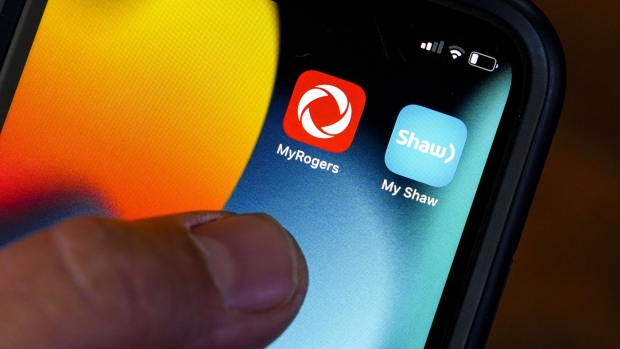
The Canadian government will allow Rogers Communications Inc. to acquire rival Shaw Communications Inc., ending a two-year odyssey for one of the biggest corporate takeovers in the country’s history.
Industry Minister François-Philippe Champagne made the announcement at a news conference Friday morning in Ottawa, confirming a Thursday report by Bloomberg News. He outlined a number of conditions, including a requirement for Rogers to create 3,000 new jobs in Western Canada and invest billions to expand 5G coverage and services.
Shaw rose 3.3 per cent to $40.44 as of 9:58 a.m. in Toronto, just below the takeover price of $40.50 a share. With the government’s blessing finally in hand, the companies expect to close the deal by April 7. Rogers was up 0.2 per cent.
Champagne gave the green light to Quebecor Inc.’s proposal to buy most of Shaw’s wireless business. Rogers and Shaw have a lot of overlap in their wireless divisions, which created a problem of too much market power. The Quebecor-Shaw side deal resolved those antitrust concerns, paving the way for Friday’s approval by the government.
The deal unites two billionaire families in a communications firm that will offer wireless, home internet and cable television to well over 10 million Canadians from the east coast to the west, with annual revenue near $20 billion (US$14.8 billion).
It’s also the realization of a long-held ambition by the Rogers family. The two companies’ founders, the late Ted Rogers and JR Shaw, were friends who sometimes did deals together. Their sons, Rogers Chairman Edward Rogers and Shaw Chief Executive Officer Bradley Shaw, have known each other since they were children.
Beyond family ties, analysts and investors have long speculated the two companies would be logical business partners. Rogers is strong in Ontario and the eastern parts of Canada, while Shaw’s domain is the western provinces. For Rogers, buying Shaw is a way to strengthen its communications network and gain the kind of scale the company says it needs to roll out 5G service and compete with BCE Inc., Canada’s largest telecommunications firm, and Telus Corp.
Toronto-based Rogers struck the agreement to buy Shaw for $20 billion in March 2021. The deal was controversial from the beginning, given Canada’s already-concentrated communications sector: Rogers, BCE and Telus command more than 80 per cent of the wireless market. The companies had hoped to close by the middle of 2022, but Canada’s antitrust watchdog sued to block the takeover, saying that it would give Rogers an unacceptable amount of control and harm consumers.
Rogers and Shaw then cut a deal with Quebecor, a major provider of cable and wireless service in the province of Quebec. The Montreal-based firm will acquire Freedom Mobile — which represents the majority of Shaw’s 2.3 million wireless accounts — for almost $3 billion, becoming Canada’s No. 4 player.
KEY AGREEMET
The Quebecor-Freedom agreement was key, because it allowed Rogers and Shaw to argue that they had crafted a solution to any antitrust concerns. They won in a case at Canada’s Competition Tribunal in December and prevailed at an appeals court in January.
The courtroom victories cleared all hurdles but one — the industry minister, who has the final say on the sale of wireless licenses from one company to another.
Champagne has said on several occasions that he is pushing the companies for binding commitments that will improve service and prices, and that he wouldn’t be bound by their timeline for closing.
Rogers faces fines of as much as $1 billion if it breaks the conditions of the deal, Champagne said, stressing that he would the companies like a “hawk.” Quebecor has also made commitments: it must invest at least $150 million in Freedom Mobile’s network over the next two years and offer wireless plans that are at least 20 per cent cheaper than competitors’, the minister said.
“Listen, I’m a lawyer and it’s a contract, so I know how to read contracts and enforce them,” he said Friday. “I would not mess with the regulator. It’s never a good thing.”
As part of the agreement, Rogers must spend $5.5 billion in expanding wireless coverage and services — $2.5 billion of that in Western Canada.